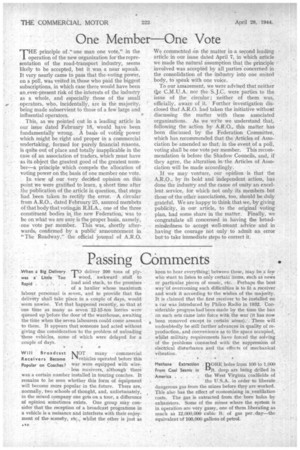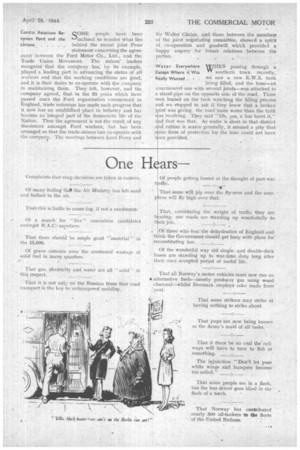Passing Comments
Page 16

Page 17

If you've noticed an error in this article please click here to report it so we can fix it.
770 deliver 200 tons of ply
When a Big Delivery was a Little "Too Rapid
wood, awkward stuff to load and stack, to the premises of a haulier whose maximum labour personnel is seven, and to provide that the delivery shall take place in a couple of days, would seem unwise. Yet that happened recently, so that at one time as many as seven 12-15-ton lorries were queued up before the door of the warehouse, awaiting the time when the seven labourers could come around to them. It appears that someone had acted without giving due consideration to the problem of unloading these vehicles, someof which were delayed for a couple of days.
1VOT many • commercial
'vehicles operated before this Popular on Coaches war were equipped with wire less receivers,, although there was a certain number installed in touring coaches. It remains to be seen whether this form of equipment will become more popular in the future. There are, normally, two schools of thought, and, unfortunately, in the mixed company one gets on a tour, a difference of opinion sometimes exists. One group may consider that the reception of a broadcast prografnme in a vehicle is a nuisance and interferes with their enjoyment of the scenety, etc.,' whilst the other is just as .11 • keen to hear everything; between these, may be a feyv who want to listen to only certain items, such as new-s or particular pieces of music, etc. Perhaps the best way-of overcoming such difficulties is to fit a receiver and Work it according to the wishes of the majority. It is claimed that the first receiver to be installed on a car was introduced by Phiko Radio in 1932.. Considerable progress had been made by the time the ban on such sets came into force with the war (it has now 'a been removed except in certain ateas).. There Will undoubtedly be still further advances in quality of re, production, and convenience as to the space Occupied, whilst military requirements have forced the solving of :the problems connected with the Suppression of electrical disturbance and the effects of mechanical vibration.
Methane Extraction . pt ORE. holes from 100 to 1,000 From Coal Seams in "ft. deep are being drilled in
America the West Virginia cealfields of
the U.S.A. in order to liberate dangerous gas from the mines before they are worked. This also liaS the effect .of economizing in ,ventilation costs. The gas is extracted from the bore holes by exhansters. Some of the mines. where the system is in operation are very gassy, one of them liberating as much aS 12,000,000 cubic ft: of gas per,day—the equivalent-of 100,000 gallons Of petrol. Cord,ai Relations Be tween Ford and the SOME people have been
inclined to wonder What lies behind the recent joint Press statement concerning the agree:. moat' between the Ford Motor Co., Ltd., and the • Trade Union Movement. The unions' leaders recognize' that the company has, by its example, played a leading part in advancing the status of all workers and that the working conditions are good, and it is their desire to co-operate with the company in maintaining them. They felt, however, and the company agreed, that in the 33 years which have passed since the Ford organization commenced in England, trade unionism has made such progress that it no* has an establghed place in industry and has become an integral part of the democratic life of the Nation. Thus the agreement is not the result of any discOntent amongst Ford workers, but has been arranged so that the trade.unions'ean co-operate with the company. The meetings between Lord Perry and
Sir Walter Citrine, and those between the members of the joint negotiating committee, showed. a spirit of co-operation and goodwill which provided' a happy augury for future. relations :between the
parties. .„ Water Everywhere VUHEN passing through a Except Where it Was " southern town, recently, Really Wanted . we saw a new E.W.S. tank
being filled, and the hose—an iinarmoured one with several joints—was attached to a stand-pipe on the opposite side of the road. Three men leaned on the tank watching the filling process and we stopped to ask if they knew that a broken j int was giving the road'more water than the tank N as receiving. They said "'Oh, yes, a bus burst it," a id that was that. As water is short in that district a d rubber is scarce generally, it seemed a pity that s line, form of protection for the hose could not have en provided.




















































